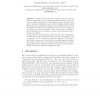IJNSEC
2008
13 years 4 months ago
2008
In this paper we propose an authenticated key agreement, which works in a braid group. We prove that our protocol meet the security attributes under the assumption that the Conjug...
AAECC
2006
Springer
13 years 4 months ago
2006
Springer
Abstract. After some excitement generated by recently suggested public key exchange protocols due to Anshel-Anshel-Goldfeld and Ko-Lee et al., it is a prevalent opinion now that th...
AAECC
2006
Springer
13 years 4 months ago
2006
Springer
The conjugacy search problem in a group G is the problem of recovering an x G from given g G and h = x-1 gx. This problem is in the core of several recently suggested public key ...
CORR
2010
Springer
13 years 4 months ago
2010
Springer
Abstract. We propose an authentication scheme where forgery (a.k.a. impersonation) seems infeasible without finding the prover's long-term private key. The latter is equivalen...
ACNS
2008
Springer
13 years 6 months ago
2008
Springer
The conjugacy search problem in a group G is the problem of recovering an x G from given g G and h = x-1 gx. The alleged computational hardness of this problem in some groups was...
ACNS
2005
Springer
13 years 10 months ago
2005
Springer
Recently, several public key exchange protocols based on symbolic computation in non-commutative (semi)groups were proposed as a more efficient alternative to well established prot...



